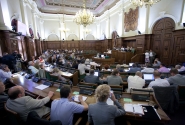
On Thursday, 26 July, in the second review the Saeima adopted amendments to the Law on National Referendums and Initiation of Legislation which were drafted by the Legal Affairs Committee.
“The Committee has improved the wording of the Law by taking into account considerations expressed by the President of Latvia, which were the basis for returning the previously adopted Law to the parliament for a second review. The new wording of the Law will clearly indicate which municipal institutions will certify signatures, reduce the expenses incurred by municipalities in relation to signature certification, and retain a two-stage procedure used in initiating legislation during the transitional period, according to which signatures of 50,000 voters should be collected in the first stage of signature collection. Furthermore, during the transition period the threshold of 10,000 signatures for the first stage of signature collection will remain in cases, where recalling of the Saeima is the subject of the initiative,” explains Ilma Čepāne, Chairperson of the Legal Affairs Committee.
The new wording of the Law adopted by the Saeima specifies that within 12 months after submitting a draft law, signatures can be certified by a notary public, municipal institutions, which register the declared domiciles of inhabitants, orphans’ courts which perform the functions of notary public, or by the chairperson of a rural municipality or city council. The fee for signature certification by orphans’ court or a local government institution is set based on the direct administrative costs incurred in the process of signature certification; however, the fee should not exceed half of the statutory amount that is required for certifying the authenticity of a signature in the orphans’ courts.
Furthermore, during the transitional period until 1 January 2015, initiation of legislation will continue to take place in two stages. In order to commence the state-funded second stage of signature collection, initiators of a draft law will have to ensure that 50,000 signatures are collected in the first stage of signature collection.
On 21 June, the Saeima in the third and final reading adopted amendments to the Law on National Referendums and Initiation of Legislation, thereby changing the procedure for initiating legislation or amendments to the Constitution by the electorate. The President of Latvia did not proclaim this Law and returned it to the parliament for a second review.
As of 2015 the amendments to the Law adopted by the Saeima will abolish the two-stage system used in signature collection by stipulating that the signatures of one-tenth of the electorate that are needed for initiating a law will have to be collected by a special initiative group set up for this purpose. Signature collection will be simplified by allowing them to be collected electronically, as well as to be certified by local government authorities. The transitional period for introducing the new procedure will last until 2015.
Furthermore, the Law is supplemented with a procedure used in initiation of recalling the Saeima which so far was not prescribed in detail. The Law also is supplemented with a new chapter on canvassing before national referendums and canvassing on initiation of a new law or recalling of the Saeima because until now canvassing before national referenda was not regulated.
The Law also is supplemented with provisions regarding the European Citizens’ Initiative by setting forth the procedure for society to get involved in shaping the policy of the European Union. The European Citizens’ Initiative envisages that one million EU citizens, who represent at least one-fourth of EU member states, can call on the European Commission to make a legislative proposal within the scope of the Commission’s competence.
Amendments to the Law on National Referendums and Initiation of Legislation will come into force on 1 September 2012.
Currently, initiation of legislation takes place in two stages. If signatures of not fewer than 10,000 voters are collected in favour of the proposed draft law, the Central Election Commission initiates the second stage of the signature collection, which is funded by the state. If a draft law is supported by no less than one-tenth of the electorate, it is forwarded for consideration by the parliament. A national referendum is held if the Saeima does not adopt the draft law without changes in its contents.
Saeima Press Service







